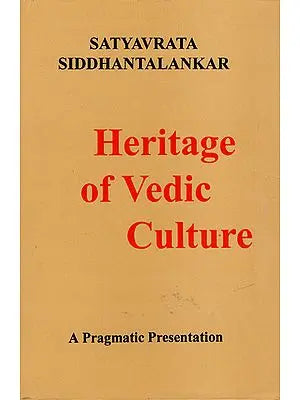Heritage of Vedic Culture (A Pragmatic Presentation)
Heritage of Vedic Culture (A Pragmatic Presentation)
HARDCOVER
Couldn't load pickup availability
Publisher : Vijay Krishna Lakhanpal
Author : Prof. Satyavrata Siddhantalankar
Language : English
Edition : 2011
Pages : 392
Cover : HARDCOVER
Dimension : 23 cm x 15 cm
Weight : 530 gm
What is Vedic culture? Vedic culture is a way of life shown to the world by the saints and sages of India. It embraces both the materialistic and the spiritualistic aspects of human existence. Id philosphical and psychological concepts coupled with its prevalent institutions, customs, and manners enable the individual to view life in the right perspective; to differentiate between appearance and reality, and to determine the relative importance that should be paid to the various aspects of existence in the different chapters of life. Its pragmatic philosophy of Enjoyment-Renunciation guarantees to the individual mental equipoise, serenity, and calm, and helps the individual to lead a life free from passions.
Vedic culture has its mine of information and knowledge in Vedic literature. The principal components of this literature are the four Vedas, nine Brahmans Granth., eleven Upanishads, six Vedangas, four Upa-Vedas, six Darshanas or systems of philosophy, and the Bhagawad Gita. The present book is therefore an exposition of the cultural heritage which we have derived from these treatises.
There are, no doubt, a number of books already in existence on this subject. But the approach of this book is new, very original, and pragmatic for several reasons. Man and the world are viewed as a whole; due emphasis being attached to the physical and non-physical aspects of existence. The discussions do not end merely with a theoretical exposition of the various philosophical and psychological concepts. It is also shown how these principles were translated into practice by means of the existing social, religious, and economic institutions, customs, manners, etc., and the corresponding benefits which both the individual and the society as a whole derived from them. Vedic culture has not been treated in isolation from the other creeds that have attracted man. Appropriate and exhaustive references have been made to the other scriptures of the world. Thus the teachings of Buddha, Christ, Mos., Mohammed, Confucius, etc., also find their footing in the book. Several important philosophical and psychological concepts of the West have been synthesized with the Vedic ideals. It is due to this blending of Eastern and Western thought that the reader will say to himself at the end of the book: 'Yes, the East and the West have been made to meet.'
Written in a simple, lucid, and comprehensive style this book is meant for: all who are interested in a new and happy way of living; those foreigners and Indians who desire to know something concrete about India's approach to life, her institutions, and her philosophy; and the university students of Indian and Western philosophy, psychology, and religion. It is truly a book intended for everybody and one which if opened with expectations will certainly be closed with profit.
Share


